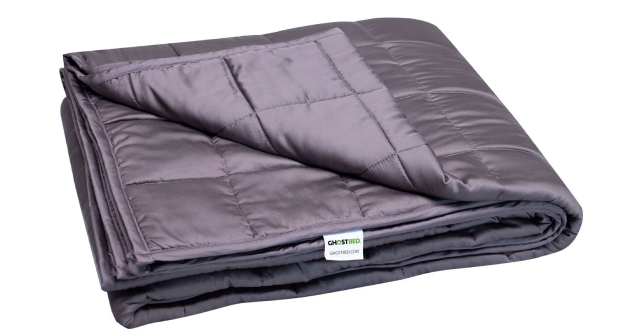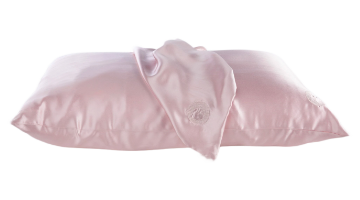Why Mattresses Sag (and What to Do About It)
Last Updated on April 11, 2025
by Marc Werner, Founder - GhostBed
Is your bed sinking in the middle? There’s nothing worse than trying to fall asleep on a droopy and worn-out mattress. If you’re wondering what causes mattress sagging, how you can prevent it, and how to fix it once it’s happened, stick around—we have answers.
Overview: Why Mattresses Sag (and What to Do About It)
Mattress sagging is part of regular wear and tear over time. However, you can slow it down by:
- 1. Investing in a high-quality memory foam or latex mattress
- 2. Rotating and/or flipping your mattress on a regular schedule
- 3. Adding a memory foam topper
- 4. Replacing your mattress when it's time
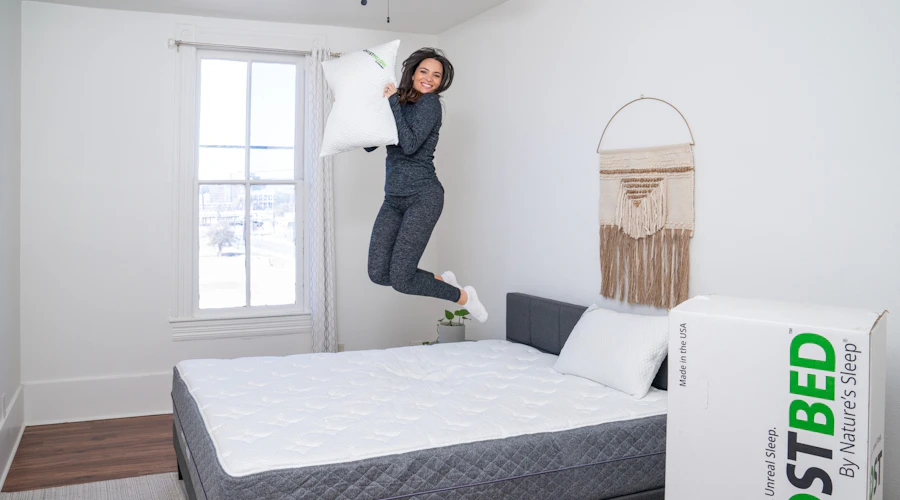
What Is Mattress Sagging?
Sagging is when the surface of your mattress starts to dip down. Often, sagging will occur under the heaviest parts of your body, like your lower back and torso—aka the middle of the mattress. A sagging mattress can make falling asleep fast near impossible because it won't properly support your spine, which can lead to aches and pains.
Mattress Sagging vs. Body Impressions: How Are They Different?
Body impressions are a whole different situation. It's unrealistic to expect your mattress to never change shape over its lifetime. Body impressions are totally normal and result from regular use. After months or years of sleeping on a mattress, most beds will develop slight body indentations. In fact, body indentations can show up in as little as weeks in some instances. It all depends on what kind of bed you have, your body size and how many people share it.
Luckily, body impressions aren't detrimental because they only affect your bed's top-most comfort layers. As long as these impressions don't go deeper than 1.5 inches, they won't affect the performance of your mattress.
What Causes Mattress Sagging in the Middle?
As we mentioned earlier, the most common place you'll notice sagging is in the middle of your mattress.
Factors that contribute to sagging in the middle include:
- Always sleeping in the same position
- Cuddling in the middle of the bed with a partner every night
- Not rotating and/or flipping your mattress frequently enough
- Using a poorly made or broken box spring or base
- Being a larger-sized person
- Not replacing your mattress when it's time
What Causes Mattress Sagging on the Edges?
If your mattress doesn’t come with edge support built-in, or you’re a plus-sized sleeper, there’s a good chance it could start sagging on the edges before you expect it to. Edge sagging is usually caused by repetitive pressure from the weight of your body—like if you sit on the edge of your bed to watch TV or put on your shoes every morning.
If you hate the idea of sagging edges, we recommend looking for a good hybrid mattress that combines contouring memory foam with the durable support of pocketed coils. GhostBed's hybrids also come with reinforced edges, for even more support.
5 Ways To Prevent and Fix a Sagging Mattress
If mattress sagging is a concern of yours, try some of the tips below as either preventative or restorative measures to get your mattress back into shape.
1. Consider Your Foundation
If you’re using a cheap or broken base or box spring, there’s a good chance it’ll cause (or has already caused) some sagging. A flimsy box spring or base can cause irreversible damage to the functionality and comfort of your bed. So, save yourself the hassle and invest in something with solid support, like our GhostBed All-in-One Foundation.
If your bed is already feeling a little worse for the wear, and you suspect your foundation may be to blame, upgrading your box spring or foundation can still help.
2. Rotate, Rotate, Rotate
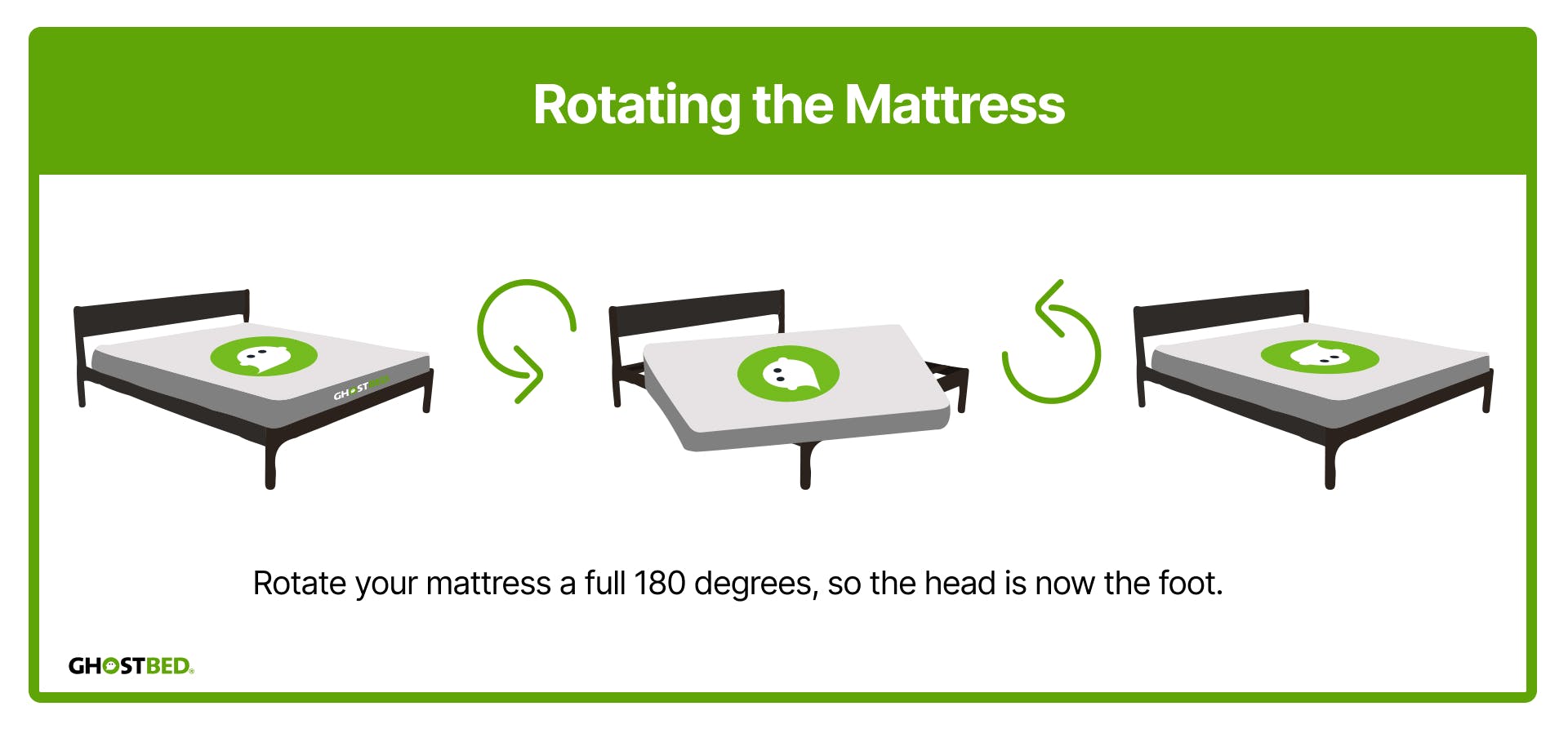
When’s the last time you rotated or flipped your mattress? If you can’t remember, there’s a good chance your bed is already starting to show body indentations. If this is the case, you still have time to remedy the situation. By regularly rotating your mattress, you can help delay premature sagging.
And the great news is if your mattress has already started sagging, rotating your mattress can still help! It’s all about giving your body new territory to rest on, as repetitive pressure is the biggest culprit (aside from buying a poorly made bed).
3. Use a Memory Foam Topper
A great way to address a mattress that has already started sagging is to add a mattress topper. This quick fix will help even out any saggy sections of your bed, making it comfortable to sleep on again. Choose the same size as your mattress and simply layer it right on top.
Marc's Tip
Ready to instantly make your bed softer, plusher and more comfortable? Our award-winning Memory Foam Topper is designed with cool, contouring gel memory foam and includes a waterproof cover—for comfort and protection all in one.
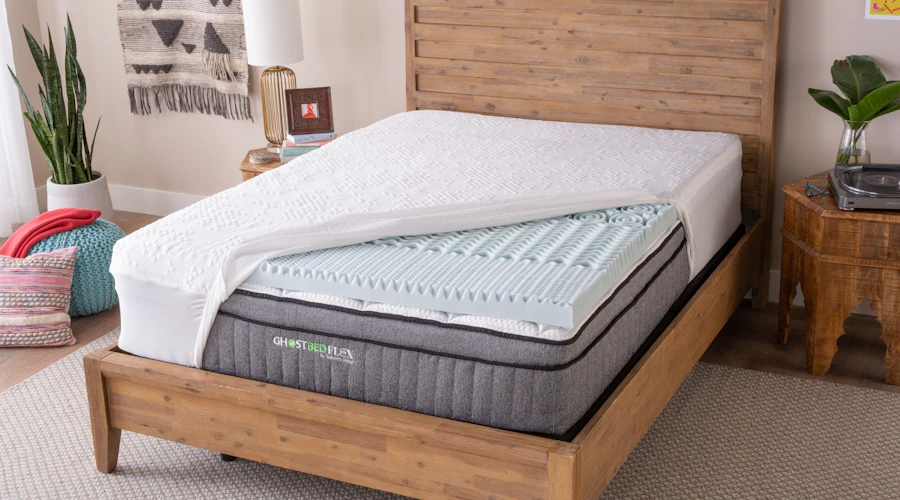 Shop Now
Shop Now
4. Add Pillows
This is a short-term fix. You can fix a sagging mattress in a pinch by loading up your bed with extra pillows to help distribute your weight more evenly. Some people like to sleep with a pillow underneath their legs, back or hips to retain their mattress’s shape and relieve pain. But remember to never place a pillow under a mattress in an attempt to fix sagging, as it leads to uneven spinal alignments and promotes early mattress aging.
5. Switch it Up
Because sagging is predominantly caused by repetitive weight and pressure, mixing up your go-to sleep position may be the solution you’ve been searching for, and best of all—it’s free! So, if you’re a die-hard side sleeper, consider switching over to team back sleeper or team combo sleeper for a while to make your mattress last longer. Ultimately, you will end up in your preferred position, but trying to sleep on a different area of your bed (or in a different position) can make a huge difference.
Mattress Sagging FAQ
Do you still have questions about what causes sagging and how to fix it? Below are some of our most frequently asked questions we get below.
What Type of Mattresses Are Prone To Sagging?
Some mattresses will inevitably break down and sag faster than others. It’s part of the natural aging process. But innerspring mattresses with an open coil system are the most likely to sag. Individually wrapped coils, like those in our GhostBed Flex, help prevent sagging because each spring responds to pressure individually, which minimizes motion transfer while providing better contouring.
What Type of Mattresses Are Resistant To Sagging?
Memory foam mattresses (like our GhostBed Classic) and beds containing latex layers (like our GhostBed Natural) will generally take longer to sag than spring mattresses.
Can Mattress Sagging Be Reversed?
Unfortunately, sagging goes deeper than your mattress’s comfort layer, making it irreversible. But you may be able to buy yourself some more time by employing some of the tips we suggested above. Sometimes, a mattress is too far gone, and it’s simply time to replace it.
How to Know It’s Time For a New Mattress
If you’ve tried everything under the sun to fix your sagging mattress with no luck, it may be time to invest in a new bed.
Here are some signs it’s time for a new mattress:
- You’re waking up with new, unexplained pain
- The sagging in your bed exceeds 1.5 inches
- Your mattress is stained or has an unpleasant odor
- Your bed is more than 8 years old
Tip: Protect Yourself With a Warranty
Sagging is usually covered in some mattress warranties, so always be sure to check. You can rest assured that every mattress in the GhostBed line comes with an industry-leading warranty that goes above and beyond what other manufacturers are offering.
For most manufacturers, their warranty doesn't kick in until your bed forms a 1.5-inch "indentation." Meaning, if your mattress is sagging down 1.5" or more, you're covered. GhostBed’s 20- to 25-year limited warranty, however, covers you at the 1" mark, which is a substantial difference in comfort and performance. Plus, our in-house warranty team is always available to help you.
Ready to find your perfect match? Our Sleep Experts are here to help. Explore our mattress collection, call us, or click the button below to take Marc’s Mattress Quiz.

Marc has spent the last two decades designing & manufacturing mattresses and other sleep products, drawing on a lifetime of experience working with the material sciences. With several patents to his name, he works closely with the GhostBed team to create products with the perfect balance of comfort & support. Learn More


